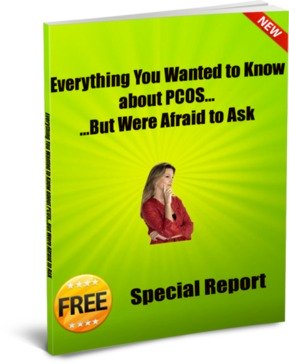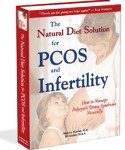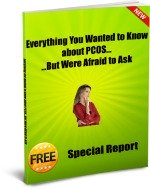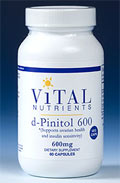PCOS Review Newsletter #17
Natural Health Ideas for Polycystic Ovary Syndrome
1) To Eat Less, Start a Meal with a Low-Calorie Salad
3) Chromium for Insulin Resistance and PCOD
1) To Eat Less, Start a Meal with a Low-Calorie Salad
Meal portion control is a big issue for many of us, especially if we are overweight and have PCOS. Here's a way to not worry about portion control at a meal. Eating a salad at the beginning of a meal may cause you to eat less food and thus cut calories without feeling deprived.
In a recent study, women were given different salads as a first course to a meal. The salads came in two sizes, 3 cups and 1-1/2 cups. Each size salad had 3 different amounts of cheese and salad dressing, so that each size salad had a low, medium, and high calorie version.
As compared to women who had no salad at all before a meal, the women who first had a "low calorie" large salad ended up consuming 12% fewer calories for the whole meal. Women who first ate a small low calorie salad consumed 7% fewer calories for the entire meal.
In contrast, those women who had a large high-calorie salad (lots of cheese and salad dressing) actually ended up eating 17% more calories in the meal than the women who ate no salad at all.
This study suggests that if you have a good-sized low-calorie garden salad before a meal, you will consume substantially fewer calories for the total meal.
If you find yourself eating more at a meal than you like, we recommend that you have a sizeable mixed garden salad first. Use only a small amount of dressing, or a dressing that is low in calories. Also, don't add cheese, ham, luncheon meats or other fatty animal foods. Some avocado is OK. Eat at least 2-3 cups of garden salad before starting the rest of your meal.
You may be pleasantly surprised to find that even though it feels like you're eating a lot of food, you'll actually be reducing your total calorie intake. The study suggests a 12% reduction in calories is possible, which is quite significant. Calorie reduction is a proven way to improve symptoms of polycystic ovary syndrome.
Source: Rolls, BJ et al, Salad and satiety: Energy density and portion size of a first-course salad affect energy intake at lunch", J Am Dietetic Assoc, October 2004, 104(10):1570-1576
2) Hair Loss and PCOS
About 15% of American women have hair loss, also known as alopecia. Loss of hair or baldness occurs when hair falls out but new hair does not grow in its place. Loss usually develops gradually and may be patchy or diffuse (all over).
Loss of hair is more than a minor cosmetic problem. It has to potential to make you feel vulnerable (naked), and can cause unfavorable changes in how you feel about yourself.
The cause of the failure to grow new hair is not well understood, but in the case of women with polycystic ovarian syndrome, excessively high levels of androgens (male hormones) are thought to be primarily responsible.
A male hormone called dihydrotestosterone (DHT), which is converted from testosterone, binds to sites on hair follicles and appears to make the follicles go into their "resting" phase sooner, which in turn starts to cause the hairs produced by those follicles to become thinner and thinner with each growth cycle.
For more information about the causes and treatment of hair loss, please visit our Hair Loss page.
3) Chromium for Insulin Resistance and PCOS
A small study of six women with polycystic ovarian syndrome and insulin resistance showed encouraging results with chromium supplementation. These women took 1000 mcg of chromium picolinate for two months, at which time their glucose disposal (insulin sensitivity) had improved by an average of 35%, and their baseline insulin levels fell by 22%. This is the only study we've found that deals specifically with PCOS.
We don't necessarily recommend that much chromium. The dosage depends on your needs and your dietary intake of chromium.
Learn more at our Chromium page.
Source: Lydic ML et al, Effects of chromium supplementation on insulin sensitivity and reproductive function in polycystic ovarian syndrome: A pilot study, Fertility and Sterility, 2003, 80(2):45-46
PCOS Health Review
This free newsletter gives you original and immediately usable information to help you deal with PCOS.
Get the latest research, tips for improving your health, answers to questions, success stories, and more!
Your e-mail address is totally secure. We will never misuse your information.
Enter Your Email Above to Subscribe Today
and Get Your Questions Answered in this Free Special Report!





